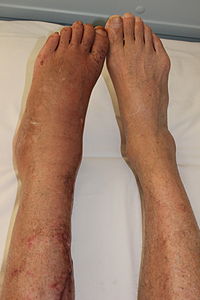
Photo from wikipedia
PURPOSE Complex regional pain syndrome (CRPS) is a longstanding condition with spontaneous and evoked pain, that usually occurs in an upper or lower extremity. Although it often resolves within the… Click to show full abstract
PURPOSE Complex regional pain syndrome (CRPS) is a longstanding condition with spontaneous and evoked pain, that usually occurs in an upper or lower extremity. Although it often resolves within the first year, it may for a minority progress to a chronic and occasionally severely disabling condition. The aim of this study was to explore patients' experiences and perceived effects of a specific treatment, designed for patients with severe and highly disabling CRPS, in order to identify possible treatment-relevant processes. METHODS The method used was a qualitative design, using semi-structured interviews with open-ended questions to capture participants' experiences and perceptions. Ten interviews were analyzed using applied thematic analysis. RESULTS Despite the fact that participants had a severe conditions, including nerve damage and a long duration of illness, they reported having been helped to increase flexible persistence, reduce fear and avoidance, and improve connections. This helped participants to significant improvements in daily life functioning. CONCLUSIONS The participants described distinct possible treatment-relevant processes leading to a substantial improvement in everyday life. The results imply that there is hope for this group that has been severely disabled for many years. This may help guide future clinical treatment trials.
Journal Title: Disability and rehabilitation
Year Published: 2023
Link to full text (if available)
Share on Social Media: Sign Up to like & get
recommendations!